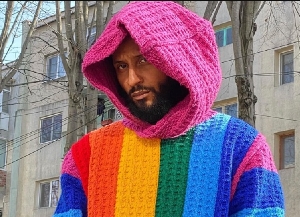 Wanlov the Kubolor has been vocal against the Anti-LGBT+ Bill
Wanlov the Kubolor has been vocal against the Anti-LGBT+ Bill
Musician and gay rights activist, Wanlov the Kubolor, has blamed colonialism, religion and poverty for the rise in hatred against LGBT+ people in Ghana.
Speaking in a recent interview with Graphic Online TV, Wanlov claimed that LGBT+ individuals peacefully co-existed in societies before colonialism.
He explained that increased hate for LGBT+ people in the country began when citizens could not get access to basic resources and social amenities.
This, he said, coupled with religious principles, led to homophobia.
"When I look at the fact that there were no stringent laws, harsh punishments, or anything out there, that is the pre-colonial era, against homosexuality or queer life, I feel like people just coexisted.
“What has happened now to us as Ghanaians is that we have been taken to this level of poverty right now. And each of us feels very neglected by the state.
"Each of us feels very neglected by the places we work. We feel like everybody is trying to take advantage, underpay us, and so on. So the average Ghanaian is not getting all the rights guaranteed by the constitution. We don't live with the kind of dignity we are supposed to.
“Then this average Ghanaian is being taught by Christianity, by Islam, and by colonial traditional religion that homosexuality is a sin.
"So when the queer community that is extra oppressed because of this homophobia steps up to say, ‘Okay, can you at least treat us like the average Ghanaian?’ The homophobic community of Ghana is like, ‘How dare you? You are a sinner. You are less of a person than me because I am a better person. How dare you ask for rights when this state I live in doesn't guarantee me or doesn't give me the rights that I deserve, even if I am being a good person.' So I feel that that indignation is at play,” he said.
Wanlov, the Kubolor's comments add to the ongoing debate surrounding the Anti-LGBT+ Bill and its impact on human rights in Ghana.
About the bill
Per the Anti-LGBT+ Bill, persons caught in LGBT+ acts would be subjected to six months to a three-year jail term, with promoters and sponsors bearing a three- to five-year jail term.
President Akufo-Addo has suspended his decision on whether or not to sign the Bill into law, citing a challenge to its constitutionality in the Supreme Court.
Even if he decides against it, MPs can, by a two-thirds majority, veto the president's decision and make the provisions of the Bill enforceable.
Watch the full interview here
ID/SARA
Ghana’s leading digital news platform, GhanaWeb, in conjunction with the Korle-Bu Teaching Hospital, is embarking on an aggressive campaign which is geared towards ensuring that parliament passes comprehensive legislation to guide organ harvesting, organ donation, and organ transplantation in the country.